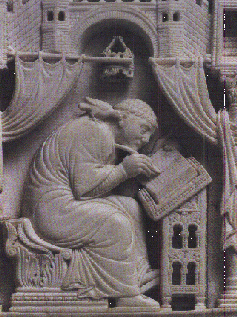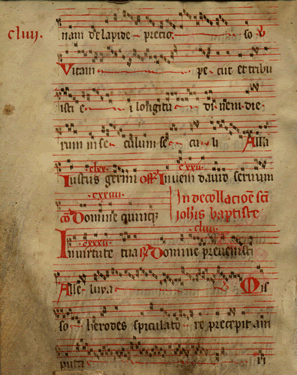|
It was the age of empires....
It is always the age of
empires.
But regarding this particular
empire, and the ambitious monarch who like many of
his kind before and since never seemed to get bored
with the idea of controlling the lives of more and
more human beings--this monarch unwittingly caused
what is perhaps the greatest revolution in the
history of musical art, through absolutely no fault
of his own.
Writing the stuff down.
 |
Imagine a world
in which music can only be learned directly from
someone else singing it to you. There is no way
to learn it from a book, no way to transmit
something of your own creation to foreign lands,
and the moment someone's memory begins to fail
them, the music is changed permanently because
it is only as real as the memories of the people
who sing it.
Actually, that is not so
hard for many people to imagine because
musical literacy is hardly universal even
among musicians, and there are some who still
think it is a bad idea. But imagine a great
symphony like Beethoven's 9th, or the operas
of Wagner. The idea of trying to transmit that
much information orally is just plain crazy.
Just as it would be impossible to build a
skyscraper without a common language of
architecture for communication and reference,
so an art that demanded a certain level of
sophistication and complexity would be
virtually impossible unless it could be made
into a material thing that could be referenced
whether you understood every detail or not. A
song, perhaps, a simple melody, can be kept in
the mind, but an eight voice motet?
|
But complexity was not exactly what
the French emperor Charlemagne in mind. He was
striving for unity. All of Europe under his beneficent
control. But of course, there was a catch.
The problem with building empires
is that somebody else usually controls part of it
before you get there. In this case, the man that would
have to be dealt with had a certain amount of sway in
Catholic Europe at the time. He was the Pope. If the
pope got behind the French king, very little could
stop him. But the Pope had his own ideas about unity.
He wanted to unify the church. In 800 A.D. the
Catholic church was the only game in town. But it had
lots of franchises, and inevitably, there were
variations in the way folks in one part of Europe were
doing business from the folks in other parts. The Pope
wanted everybody to conform to Rome's way.
When a reformer comes to town
artists are usually on a pretty short leash.
Local customs are generally gone; you can forget
personal freedom. Everybody had to start
chanting just like they did in Rome. There was to be
no other way.
But, you are asking, how is little
old Rome going to get all of Europe to subscribe to a
system they can't possibly know anything about? They
can't just pass out pamphlets with the relevant
information. There is no way to write any of this
down!
And so, in the days before business
class, armed with only a few bags of peanuts, a few
brave souls were mandatorialy dispatched to the
northern climes, namely Gaul (France), where, in
exchange for Papal support, Charlemagne was going to
have to surrender his chant.
These traveling music teachers may
not have been as cooperative as the Pope had wanted.
Depending on whose side you listen to, either the
teachers were really incompetent, or intentionally
trying to sabotage the project. Or the locals just
didn't care for doing things somebody else's way.
There is plenty of finger pointing left to us in the
languages they could already write down.
Either way the attempt was a
failure. The Pope soon found out about it and recalled
the teachers, exiling or imprisoning them for good
measure. A second attempt was made. This time, nobody
was told what was going on. The Pope simply planted a
couple of secret agents inside the monasteries at the
offending places and waited for the results.
Somewhere in this politic soup a
discovery was made by two guys named Odo and Guido.
They were able to fix the pitch of a particular chant
by writing it above or below a line on a page. They
were also able to teach this principle to the young
boys they were training to be monks. Eventually
news of this magical method made it back to the ears
of the pope. Soon it was being used to standardize
chant throughout Europe.
| Imagine
being able to sing at sight a melody you had
never heard before. The very idea would have
been considered madness until Odo made his
spectacular claims. Now, music was about to
become "a thing made," and composers began to
get a little more respect. But changing local
customs, now that was the real struggle.
It wouldn't have been
enough to simply require the locals to give up
their cherished methods--that much was obvious
from the previous attempt. How often are we in
a debate with someone who says "who are you
to decide such-and-such?" No matter that
the who-are-you happened to be the Pope. Even
the Pope was having some trouble being the
Pope. In a few centuries there would often be
two or even three "Popes" because all of
Europe couldn't agree on one. In order to get
the locals to accept not only the Roman
methods and the fact that they were
now being written down (something that the
young folks could get used to easily but was
making all manner of trouble for the older
generation), it was necessary to furnish a
divine lie.
|
 |
It would take a very large library
and several shelves full of CD ROMs to catalog all of
the divine lies that have been deemed necessary to get
the populace to tow the line. It was believed that the
only way people in other territories would accept this
new repertoire to completely supplant their own was if
it was thought to be of divine origin.
So a new legend was born about a
Pope named Gregory who single-handedly created the
entire repertory of (Roman) church chant then in use.
It had all been dictated to him by the Holy Spirit.
Stories were told, paintings were made, the Spirit
being depicted as a Dove, and eventually the
saying "A little birdie told me" came into the
English language.
Never mind that Gregory was
(probably) not a musician. Or that his Papacy had come
to an end well before the beginning of written music,
three centuries prior to the debate you are reading
about. He had instituted a number of reforms
to the liturgy, and that was good enough. Medieval
music in the church soon became known as Gregorian
chant, and, on the basis of this claim, Roman chant
eventually made some major gains in western Europe.
But of course a very significant
cat had emerged from that bag in Rome, and, while
nothing that causes change ever takes hold quickly,
music in Europe was soon to change radically, and to
little resemble music from anywhere else in the world.
Being able to write it down would soon mean that
different tones could be sounded simultaneously, once
somebody figured out how to notate rhythm (that was
another laborious struggle), and with it, harmony was
born. So were professional musicians, and composers
who became celebrities even though most were still
considered servants, and musical compositions that
could make their way through many lands.
|